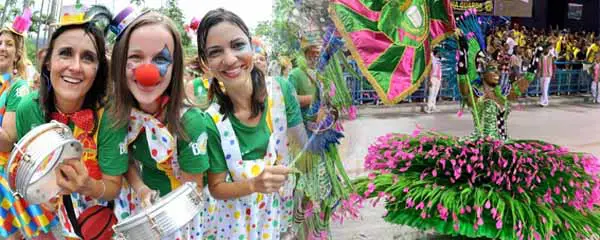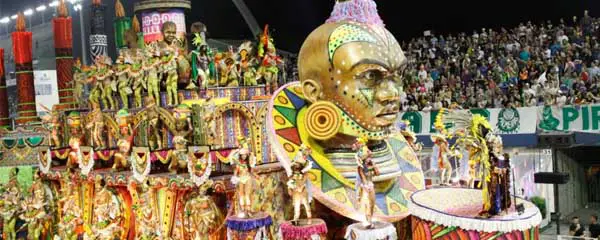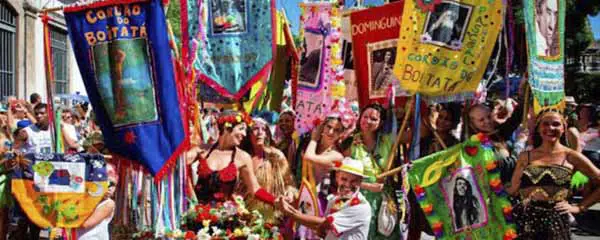Blog
All About Carnival in Brazil – History, Where to Go & Vocabulary
- Thursday February 24th, 2022
- Posted by: Amanda Ennes
- Category: Brazil

If you want to learn all about Carnival in Brazil, search no more. In this blog post, we talk about the history of Carnival, the samba schools, and the best cities to visit during the Carnival season in Brazil. Moreover, we also teach you some Carnival vocabulary so you are prepared to celebrate in Brazil.
History of Carnival in Brazil
The origin of Carnival has to do with Christianity and its roots in Middle Ages. Back then, people would wear masks and disguises to celebrate the time before Lent. Even today, Carnival still has a certain connection with Christianity, as the official date for this celebration changes every year according to the Christian calendar. We celebrate Carnival 40 days after Palm Sunday every year. That means Carnival usually falls by the end of February or the beginning of March.
During colonial times, the Portuguese brought Carnival festivities to Brazil, especially Rio de Janeiro. With time, rich people were organizing masquerade balls in the country, making Carnival a popular season. Also around that time, people started to parade on the streets, wearing their masks and costumes. However, samba was not yet a thing.
Read more: History And Types Of Samba In Brazil.
The music people would play the most during Carnival season was marchinha, a genre of music that would serve as a comic satire of military marches. Nonetheless, by the end of the 19th century, samba started to grow among the slums of Rio de Janeiro and the general population. With time, it became the most popular genre of Carnival music.
Not long after that, around the ’20s, the first samba schools were established in Rio de Janeiro.
Meanwhile, in 1950 in Bahia, Carnival was growing differently than in Rio. With the invention of the trio elétrico, Carnival began to revolve around axé music, not samba. Trio elétrico is an adapted sound truck often used for street parties and large musical events.

Samba Schools
Differently from what it might seem, the samba school has nothing to do with formal educational instruction. Samba schools are associations founded by civilians to praise samba and celebrate Carnival. They have a solid community basis and a strong bond with local neighborhoods or favelas.
Around the ’30s, samba schools started to compete against each other, organizing the first parades.
Nowadays, there are over 70 samba schools in Rio de Janeiro. Because of that, there are different leagues in the competition for the best school of the year. The Special League (Grupo Especial) is divided into two groups that parade on the Sunday and Monday of the Carnival season. They compete to crown the winner of the samba school parade every year. The parade lasts about one house and has to follow a number of rules. The Access League (Grupo de Acesso) parades on the Friday and Saturday before the Special League and competes to be promoted to the main league the following year.
To sum it up, the samba school’s competition work just like a football state championship.
The samba school’s competition is such a big deal nowadays, that they take over a year to prepare for their parades. That includes choosing a theme, doing research, creating floats and costumes, writing original songs and deciding which one to use, and more. Thousands of people are involved in the making of each samba school’s parade, such as designers, painters, seamstresses, woodworkers, musicians, choreographers, and much more.
Parades
As stated above, the samba schools need to follow certain rules for their parades. Each Carnival organization decides on these rules. In Rio de Janeiro, for example, the parade has a maximum time of 70 minutes, with a minimum of 4 and a maximum of 6 Carnival floats.
The parade is divided into wings. No special wing is required, but some of them are traditional in every parade. For example, Ala das Baianas, in which ladies dress in clothes reminiscent of the early twentieth century. Also popular is Velha Guarda, a wing of only elderly people that once had honorable roles in the samba school, such as dancers, musicians, and directors.
Each parade is judged and scored on:
- Allegorical floats and props (Alegorias e adereços): The Carnival floats.
- Drumming Section (Bateria): The Carnival orchestra of each school.
- Front Commission (Comissão de Frente): The first group of participants in a parade. They dance to a well-rehearsed choreography to introduce the theme the samba school is presenting.
- Plot-theme (Enredo): The theme each school is presenting.
- Progression (Evolução): The pace and speed of the parade must be in sync with the music.
- Costumes (Fantasias): The design and ideas for the clothes.
- Harmony (Harmonia): Everyone at the parade must be singing and dancing.
- Mestre-Sala and Porta-Bandeira: A couple with a special costume that dances while paying tribute to the samba school’s flag. Each school can have more than one couple honoring the flag, but only the main couple is judged.
- Samba song (Samba-enredo): The original melody and lyrics composed for the parade.
Sambadrome
The sambadrome is the place samba schools parade during Carnaval in Brazil. There are spectator viewing areas around the avenue and VIP suites that offer open bar and special attractions.
Famous samba schools
In Rio de Janeiro, some of the most popular and traditional samba schools are:
- Portela – founded in 1923 – 22 titles
- Mangueira – founded in 1928 – 20 titles
- Beija-Flor – founded in 1948 – 14 titles
- Salgueiro – founded in 1953 – 9 titles
- Imperatriz Leopoldinense – founded in 1959 – 8 titles
- Mocidade – founded in 1955 – 6 titles
- Unidos da Tijuca – founded in 1931 – 4 titles
- Unidos de Vila Isabel – founded in 1946 – 3 titles
Further reading: Top 5: Main Traditional Brazilian Festivals.

Blocos de Rua
Blocos de rua, also called bloquinhos or carnaval de rua are the street parades organized all around the city during Carnival season. Even though they are huge in Rio de Janeiro, blocos de rua are organized all over different cities in Brazil, such as São Paulo, Recife, Ouro Preto, and Florianópolis.
Street bands followed by an adapted sound truck (trio elétrico) play lively, fast-paced, and energetic music. Even though many bands play samba, marchinha is the most popular music genre in blocos de rua.
For example, there is a famous Carnival group in Brazil called Sargento Pimenta (Sergeant Pepper) that only plays Beatles songs. However, they use the marchinha beat while doing so.
Watch the Sargento Pimenta band playing All My Loving Carnival-style:
Costumes
The most important thing about Carnival is costumes.
Since the beginning of Carnival celebrations in Brazil, masks were always part of the attire. By 1870 people were already using costumes to make their Carnival more fun. Yes, that was way before samba was even invented!
So, you need to prepare for Carnival — one different costume a day. Be creative, use lots of glitters and colorful props. Do that and you are ready for Carnival!
Where to Enjoy Carnival in Brazil?
Rio de Janeiro
In Rio de Janeiro you do not need to choose between watching the samba schools’ parade or enjoying the street Carnival because we have it all. You can join the blocos during the day and watch the parades in the evening. Rinse and repeat for four days straight!!! There are over 500 ‘blocos de rua’ in Rio and you will have the time of your life.
Salvador
If you want to try something different from samba, Salvador has the best axé music festivities during Carnival. Some Brazilians say everyone must spend at least one Carnival season in Salvador.
Recife and Olinda
One of the most traditional ways to celebrate Carnival is going to Recife and Olinda, sister cities in Pernambuco. The street Carnival is huge there, and you can try Frevo — the local music genre and dance. Guinness Book of World Records registered Galo da Madrugada, a bloco de rua in Recife, as the biggest carnival parade in the world. Over 2,500,000 people followed their parade in 2013.
Watch Teacher Deise’s video on Pernambuco.
Ouro Preto
Ouro Preto is a small historical city in the state of Minas Gerais. The Carnival there is famous among young partygoers, especially college students. That is because Ouro Preto is also a university town. The street Carnival is great and the college dorms and fraternity houses also throw awesome parties.
Carnival Vocabulary
| Portuguese | English |
|---|---|
| Blocos de rua/Blocos de carnaval | Street Carnival/Street parties during Carnival |
| Carro alegórico | Carnival floats |
| Confete e Serpentina | Confetti and Serpentine streamer |
| Desfile | Parade |
| Escola de Samba | Samba school |
| Fantasia | Costume |
| Folia | Party |
| Folião | Partygoers |
| Marchinha | The first music genre linked to Carnival in Brazil |
| Pular carnaval | To celebrate Carnival/To go out for Carnival |
| Purpurina | Glitter |
| Rainha de bateria | Drumming section queen |
| Rei Momo | King Momo – the king of Carnival |
| Samba | Brazilian music genre linked to Carnival |
| Trio elétrico | Special sound truck used in Carnival |
How About Carnival in 2022?
Due to the increase of Covid cases in Brazil, most cities decided to cancel Carnival in 2022. On January 4th, 2022, the mayor of Rio de Janeiro released a statement canceling street Carnival in 2022. The samba schools’ parade at the Sambadrome, however, was only postponed to April 2022.
Read more: Carnival 2022 In Rio de Janeiro: What do We Know So Far?
If you are planning on coming to Rio de Janeiro for Carnival someday, how about arriving a few weeks early and learning some basic Portuguese to help you around the city? Caminhos Language Centre offers Portuguese group courses and private lessons to help you get a grasp of street Portuguese and Brazilian culture. We also have a 4-hour Portuguese crash course to help you with the basics.


 Deutsch
Deutsch Français
Français Português
Português Español
Español




